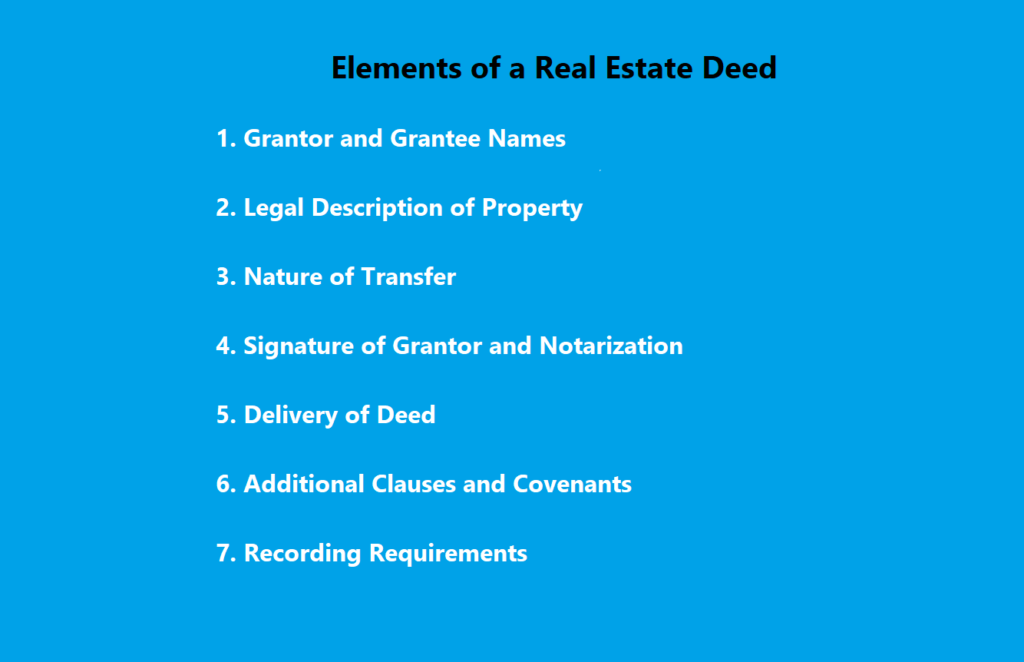Real estate deeds are documents that transfer ownership of property from one party to another. When buying or selling a home, understanding these documents and their contents is essential for completing the transaction successfully. This guide will provide an overview of real estate deeds, including what they are, how they work, and the key components you need to know before signing on the dotted line.
Deeds require two parties to sign them in order for the transfer to be valid, and they must be recorded with the county or state for it to be legally binding. Deeds typically include information about the person transferring ownership (the grantor) and the person receiving ownership (the grantee) and a description of the property in question. The most common type of deed is a warranty deed, which guarantees that the transfer of ownership is valid and free from any encumbrances or defects. Other types of deeds include quitclaim deeds, special warranty deeds, and grant deeds.
Types of Real Estate Deeds

The six main types of real estate deeds are General Warranty Deeds, Quitclaim Deeds, Bargain and Sale Deeds, Grant Deed, Mortgage Deed, and Deed of Trust. Each type is used in different situations, so it’s important to understand the differences between them.
General Warranty Deeds: A general warranty deed is the most comprehensive type of deed, providing the buyer with protection from any potential legal issues related to ownership of the property. This guarantees that the seller is the true owner and has not sold or encumbered the property in any way.
Quitclaim Deeds: A quitclaim deed is typically used when transferring ownership between family members or close friends who trust one another. This type of deed does not guarantee that the seller is the rightful owner, so buyers should be aware of this before signing.
Bargain and Sale Deeds: A bargain and sale deed is similar to a quitclaim deed but provides more assurance that the seller is the rightful owner. This type of deed does not offer any warranty against defects or encumbrances on the title. So, buyers should still do their due diligence prior to signing.
Grant Deed: This is used to transfer ownership from one party to another but does not provide any warranty of title. The grantor is only promising that they have not encumbered the property beyond what’s disclosed in the deed.
Mortgage Deed: A mortgage deed is a type of deed that is used when buying a property with financing. This document contains information about the loan and provides security to the lender if the borrower defaults on their payments.
Deed of Trust: This is another type of deed that’s used when financing a property purchase. This is a legal instrument that allows the lender to take possession of the property in case it isn’t paid back as agreed.
Understanding the legal aspects of real estate deeds is essential for anyone buying or selling a home. It’s important to read and understand all the documents involved, including any deed that transfers ownership of a property. Knowing what type of deed is appropriate for your situation is key to ensuring a successful transaction. With the right knowledge and understanding, you can confidently sign any real estate document with confidence.
ALSO READ: REAL ESTATE INVESTMENT TRUSTS – REITs: COMPLETE GUIDE
Elements of a Real Estate Deed

Real estate deeds are legal instruments used to transfer ownership of a property from one person to another. While the details of each real estate deed can vary, there are several key elements that all such documents will have in common. These are:
1. Grantor and Grantee Names
The grantor is the party transferring ownership, while the grantee is the party receiving ownership. Both names should be included in the document, along with their contact information and address.
2. Legal Description of Property
A legal description of the property being transferred is also important. This includes a thorough listing of all physical characteristics and boundaries of the parcel, such as its size and features like water sources and access roads.
3. Nature of Transfer
The deed will also indicate the type of transfer taking place, whether it is a sale, gift, trust, or will.
4. Signature of Grantor and Notarization
The grantor must sign the document, and it should include a statement that they are conveying title to the property without any reservations. It’s also important for the deed to be notarized or witnessed to make it legally binding.
5. Delivery of Deed
The deed must be delivered to the grantee in order for it to take effect. The grantor must hand over a copy of the deed to the grantee and have it accepted before ownership is transferred.
6. Additional Clauses and Covenants
Depending on the specifics of the transaction, additional clauses and covenants can also be included. These could consist of conditions for payment or stipulations about how to use the property.
ALSO READ: What is Living Trust vs Will?
7. Recording Requirements
The deed should include a statement that it must be recorded in order to be valid. The recording is the process of filing a copy with the local government office responsible for keeping such records. This helps ensure that everyone involved knows and agrees on who owns what property.
Understanding the various types of real estate deeds and their elements is essential for anyone involved in a property transaction. This knowledge can help ensure that the process goes smoothly and that all legal requirements are met.
ALSO READ: How Many Jobs are Available in Real Estate investment Trusts
In Conclusion
It’s important to remember that deed documents are only one part of a real estate transaction. Other documents and paperwork, such as title searches and loan agreements, must also be completed in order for sale to move forward. Additionally, it’s important to consult with an experienced real estate attorney who can help guide you through the process and ensure that everything is done properly.
Understanding the various elements of real estate deeds can help buyers, sellers, and investors alike make informed decisions when buying or selling property. With a better understanding of these documents, everyone involved in a real estate transaction can be more confident signing on the dotted line.
ALSO READ: THE BEST PAYING JOBS IN REAL ESTATE INVESTMENT TRUSTS




